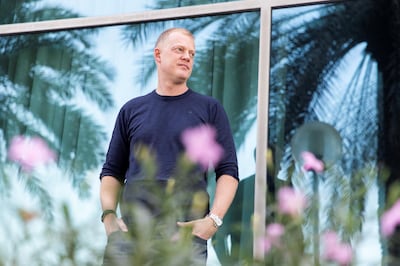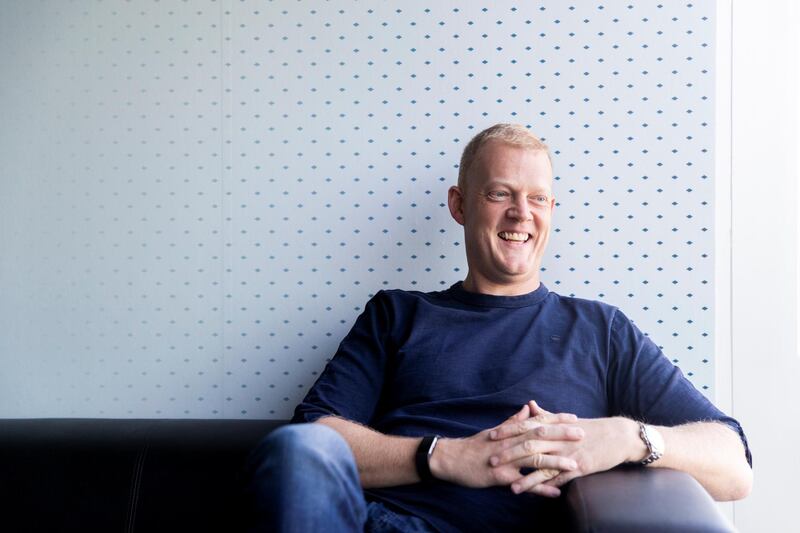David Hanson is the general manager of Imax Private Theatre. He moved to Dubai in early 2005 with Showtime, the TV company that later became OSN. The Briton, 40, lives in a rented Safa villa with his wife Emma and two sons, aged 2 and 6 months, and confesses to having made “nearly every financial mistake in the book” in his 13 years in the UAE.
How did your upbringing shape your attitude towards money?
My mum was a single working parent for most of my childhood and sacrificed a lot to give us a comfortable life. So you would expect me to say that I was very careful with money. Unfortunately, I think she did too good a job, because I definitely took it for granted and just expected all the latest trainers and toys. I was very selfish. Now that I have children of my own, I can appreciate what she did for us. I like to spoil her at Christmas and birthdays. I really believe financial basics should be taught in schools; it’s crazy how little financial education kids receive.
How much did you get paid for your first job?
I had a job from very early on, because I always wanted to have money to spend. My first job was my paper round when I was 12 - getting up on dark, cold, wet English mornings for 2 pence (1 fil) per paper. I loved it and used to get lots of Christmas tips for being cheerful. After that, I worked in a cricket bat factory, sweeping up wood shavings for £1 an hour (Dh4.80) when I was 13. All the international cricketers used to come in to get bats, so I was in heaven.
Are you a spender or saver?
I was a shocking spender until my mid-thirties - a marketing person’s dream, because I always wanted the latest gadget or brand. I self-funded a £55,00 MBA in 2011 and, for the first time, understood how I could make my money work for me. It made so much more impact, exponentially, on my personal finance than just salary increases. That was a real epiphany and, since then, I have been an avid investor. It becomes much harder to spend your money on things you don’t need when you can project your future returns on the same amount.
_________
Read more:
Money & Me: 'I wish I had invested more in cryptocurrencies two years ago'
Money & Me: 'I have Indian culture in my DNA - I live within my means'
Money & Me: 'If you only save and never spend, what type of life are you living?'
Money & Me: 'I was a cash millionaire by the age of 25'
________
What is your most cherished purchase?
Without hesitation, my wife’s engagement ring. I inherited some money when my father died in late 2011, and it cleared probate just as we were about to go on holiday to the Maldives. I had already asked her dad’s permission, so it seemed like a sign. I knew roughly what I wanted, and couldn’t find it, so I drew it for a jeweller in Dubai. There’s a lot of emotion tied up in that little object - I’ll never forget my wife’s face when she saw it. I paid about six weeks’ salary for it.
Have you ever had a month where you feared you could not pay the bills?
I’ve had months where I couldn’t - and didn’t. Having debt collectors call at your mum’s house and getting threatening letters every day is horrible. I left university in 2000 with £20,000 (Dh95,000) debt in student loans, overdrafts and credit cards. My first job as an editorial assistant paid £9,000 (Dh43,000) per annum, which barely covered the season ticket to travel into central London and my rent. I was living hand to mouth, hiding the debt from people and hoping it would go away. I eventually renegotiated and consolidated the debt, and only paid it off about two years after moving to Dubai. If anyone is going through that now - don’t hide from it, address it immediately. You can get out of it, but you need a plan and lots of discipline.
Where do you save?
I have a UAE e-savings account linked to my current account for a very small rainy-day fund (maybe Dh25,000), but the interest is woeful. Then I have Dh100,000 in a UAE-based peer-to-peer lending platform that returns about 10 per cent. Given the current exchange rates to sterling, I transfer a lot of money to my offshore investment platform, about every three months, where I invest in index trackers, exchange-traded funds (ETFs) and individual equities.
Do you prefer paying by credit card or in cash?
I use Apple Pay a lot for day-to-day items like coffee and lunch, my credit card for big items to get the points (but I always pay it off in full every month), and cash for haircuts, taxis and restaurants, so I can tip.

What has been your best financial investment?
Investing in myself through the MBA has had a huge impact but, as far as assets go, probably our rental properties in the UK. Because we bought them outright, we haven’t been affected by the recent tax changes [which are phasing out tax relief on landlords’ mortgage payments]. They return between five and six per cent yield. Buy-to-let can be very hands-on and, if you get a bad tenant, very stressful.
What do you most regret spending money on?
Probably my beautiful Jaguar F-Pace Sport car. I bought it new 18 months ago and spent about Dh300,000 on it. I didn’t finance it, so at least I’m not paying more than that in interest, but it was a ludicrous amount to spend on a car and it spends most of its time covered in raisins, with two child seats in the back. I’m planning to sell it and get a sensible family car like a Ford Focus. I’ll probably get Dh240,000, so will have lost 20 per cent of the value.
Did you ever buy property in Dubai?
I bought a two-bed apartment in Jumeirah Lake Towers off-plan in 2007. Initially the deal was pretty good but then I had to start paying a mortgage on Dh1,250,000 even though it wasn’t quite handed over - and Dewa and services - and I was paying rent still. At one point it doubled in value, then it dropped to Dh800,000 - on paper. Fortunately, my job held steady, I carried on living there and sold it in 2013 for Dh1,100,000.
What financial advice would you offer your younger self?
Nobody is as qualified or as incentivised to look after your money as you. I’m one of the many people in the UAE who signed up for these 25-year fixed-term savings schemes from financial advisers. I was invested in two over 10 years, through one of the biggest bull markets in history, and I still just about broke even and took out $230,000 (Dh845,000). I made a New Year’s resolution in 2017 to get complete control of my money, closed both schemes and I’ve never looked back. The only good thing about them was that they forced me to save every month.
Do you have a financial plan for the future?
I track everything. Day to day, I use a mobile app that collates everything I spend against a target of saving half my salary. Then I have a wonderful Excel sheet I built, that tracks all my investments and savings to give my net worth from January 2014 through to today. It then projects conservative returns on them so that I can see where we should be by December 2023, not including bonuses or pay increases. By the end of that five-year period, we will be in a position where we have complete, comfortable financial independence if we track in the same way – financial serenity.
Do other people ask your advice now?
That's why I started blogging as Dubai Money Guy, to share that journey. I started following a lot of financial independence (FI) blogs – not to retire straightaway or live a really frugal lifestyle but to make sure that, when our time in Dubai finishes, we have the absolute maximum to show for it. Other FI blogs talk about things like riding a bike instead of driving a car – they don't transfer here. I wanted to bring some of the principles to Dubai, the world's centre of consumption! So, for instance, we've put in artificial grass in the garden and I want to blog about what it's done to my Dewa bill. I aim for financial serenity: a position where our finances take care of themselves and we are free to define the life we want to lead.






